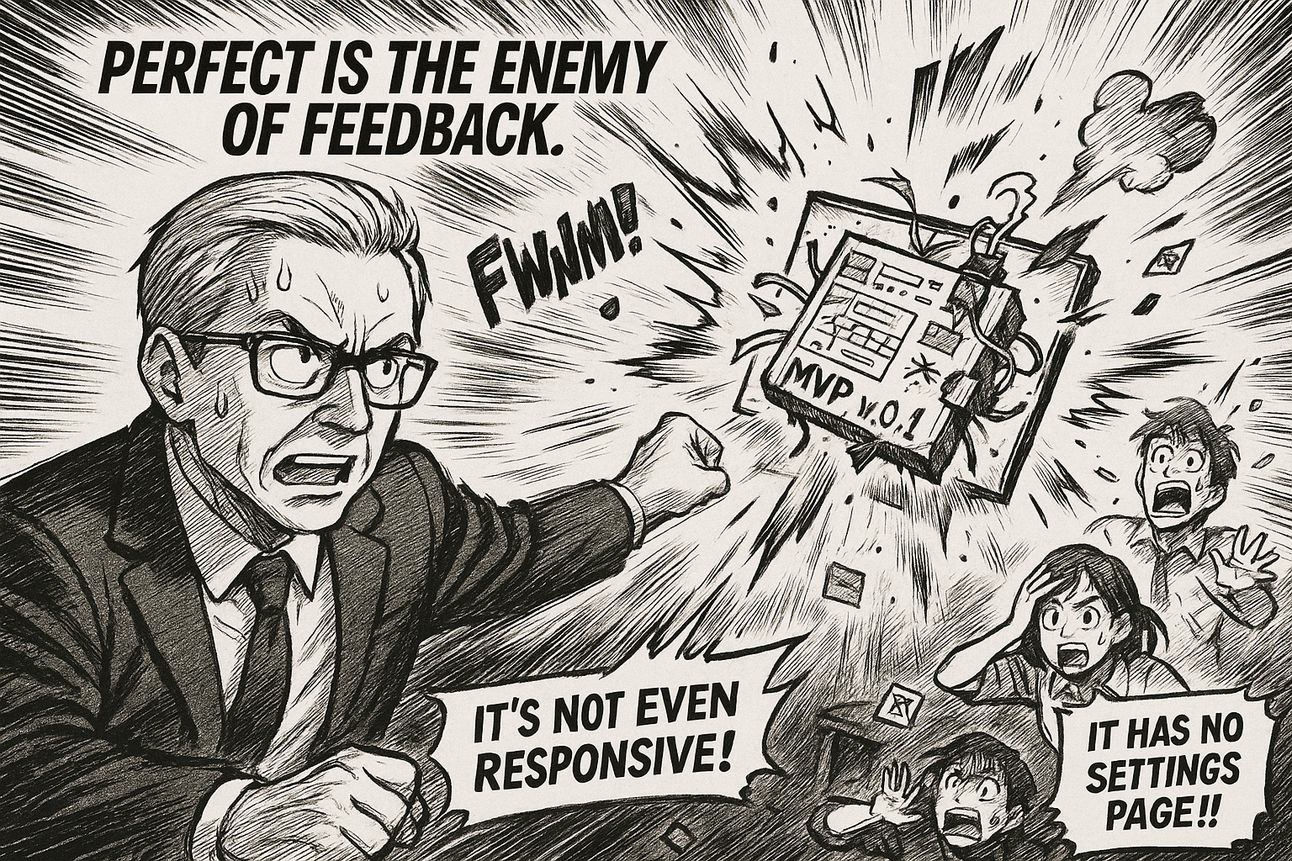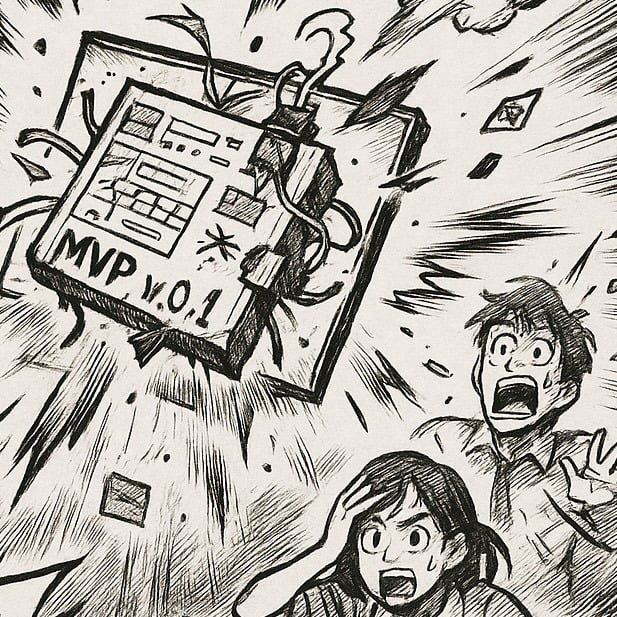- The Cranky PM
- Posts
- Your MVP Is Too Polite. Ship Something That Might Actually Offend Someone
Your MVP Is Too Polite. Ship Something That Might Actually Offend Someone
Your MVP development is failing because you're building for everyone. Learn why successful product launch strategies require opinionated features that some people will hate.

Your Minimum Viable Product isn't minimum, it isn't viable, and it sure as hell isn't a product. It's a committee approved, focus group tested, lawyer vetted piece of beige corporate meh that offends absolutely no one because it does nothing interesting.
It’s the startup equivalent of elevator music. Completely forgettable, and designed to avoid any strong reactions whatsoever.
Congratulations, you've created something so inoffensive that no one will ever love it, let alone pay for it.
If your MVP development doesn't piss off at least 30% of the people who see it, you haven't built something opinionated enough to matter. You've built something safe enough to fail quietly while you pat yourself on the back for being "user centric".
The Tyranny of Universal Appeal: How You Become a Product Coward
Somewhere along the way, we convinced ourselves that good products appeal to everyone.
This is complete bullshit.
Good products appeal intensely to some people and are completely irrelevant to everyone else.
Great products have actual haters who actively dislike what you've built and aren't shy about saying so.
Your "user-friendly" interface is user-generic.
Your "intuitive" workflow is so bland that no one has strong opinions about it either way.
Your "accessible" design is invisible because it blends into a background of mediocrity.
You've spent so much time trying to avoid alienating potential users that you failed to attract actual users.
You've optimized for theoretical market size instead of actual market passion.
This is the core problem with modern MVP development: you're too scared of failure to have an opinion on success.
The Features You're Too Scared to Ship
Remember the feature you really wanted to build but decided was "too opinionated" for the MVP development process?
The one your legal team said was "potentially controversial"?
The workflow your designer said was "too prescriptive"?
That's exactly what you should have shipped first.
Those opinionated features aren't bugs. They're your entire value proposition.
They're what separate your product from the seventeen other beige solutions in your market that all do the same shit with slightly different color schemes.
They're what make people say "holy fucking shit, someone finally built this!!111!" instead of "oh, another tool that looks exactly like the last one"
But you removed them because they might "limit market adoption." You know what actually limits market adoption? Being so piss weak generic that no one remembers you exist five minutes after seeing your demo.
Successful product launch strategies embrace polarization, not run away from it.
Stop building products for people who will never love you anyway.
Build for the people who will tattoo your logo on their fucking forearm.
Stop Apologizing for Having Opinions
Your product should have a point of view.
Not a marketing-approved, stakeholder-aligned, diversity-and-inclusion-committee-vetted point of view.
An actual fucking opinion about how things should work.
If you're building project management software, have an opinion about how projects should be managed. If everyone can use your tool exactly how they want to use it, your tool doesn't actually do anything. It's just a fancy database with a UI that someone's nephew could have vibe coded in a weekend.
Opinionated software forces users to work in a specific way because that specific way is demonstrably better for the specific problem you're solving. Generic software lets users work however they want, which means it's not actually solving any specific problem. It's just enabling people to do the same stupid shit they were doing before, but now with better fonts.
This is where most MVP development goes wrong; you build with flexibility instead of conviction because you're terrified of being wrong about something.
Why You're Building Shit No One Wants
You know why focus groups love boring shit? Because focus groups are designed to find the lowest common denominator. They're designed to identify what everyone can tolerate, not what anyone actually wants or needs.
No one (and I mean NO ONE) has ever left a focus group session saying "I need this now and I'll pay whatever it costs". Focus groups produce feedback like "it's nice" and "I could see myself using something like this" and "it seems useful". That's the sound of people being polite about mediocrity.
That's not product-market fit. That's product-market politeness. There's a huge fucking difference, and if you can't tell the difference, you shouldn't be building products.
Real validation sounds like "how the hell did you know I needed exactly this!", "where has this been all my goddamn life" and "I'm canceling my current solution immediately".
Ship Something That Takes a Stand
When your too polite MVP development lacks conviction, you don't believe strongly enough in your own solution to risk alienating people who wouldn't benefit from it anyway. What you end up with is products built for imaginary people instead of real problems.
A CRM that works "for all business types" instead of a CRM that's incredible for consultancies and completely wrong for everyone else, or a scheduling tool that's "flexible for any workflow" instead of a scheduling tool that's perfect for agencies and useless for retail stores.
Stop hedging your bets.
Stop building for everyone because you're too scared to pick a lane.
Build something that's obviously, aggressively right for a specific group of people and obviously, aggressively wrong for everyone else.
The Uncomfortable Questions You're Too Chicken to Ask
Before your next product launch, answer these honestly:
Who would hate your product and why? If you can't answer this, your MVP development isn't opinionated enough to matter.
What would your competitors' users say is wrong with your approach? If nothing, you're not differentiated enough to justify your existence.
What workflow does your product force that users might initially resist? If none, you're not solving a hard enough problem to charge money for.
What features did you remove because they were "too niche"? Those were probably your most valuable features, coward.
What would make a subset of your market say "this is exactly what I needed"? That's your actual value proposition, not the generic shit in your landing page.
Why Pissing People Off Is Good Business
Polarization isn't a bug. It's a feature.
Products that everyone thinks are "fine" generate no word-of-mouth, no passionate advocacy, and no viral growth.
Products that some people love and others hate generate conversations, strong opinions, and organic marketing that you couldn't buy with a million dollar ad budget.
Look at every successful product launch in the last decade. Did they generate universal praise? Hell no. They generated intense love from their target market and vocal criticism from people who weren't their target market.
The criticism wasn't a sign of failure. It was a sign of differentiation. It meant they'd built something opinionated enough to have actual haters alongside their actual fans. That's what separates effective product launch strategies from the generic garbage that gets launched on Product Hunt and forgotten the very next day.
What Offensive Actually Means
We're not talking about being offensive in the asshole sense.
We're talking about being offensive in the "this challenges how I currently do things and makes me uncomfortable because it suggests I've been doing it wrong" sense.
Your product should offend people's existing workflows, existing assumptions, and existing compromises.
Good products are offensive to the status quo. They imply that the way people currently solve problems is suboptimal. They suggest that users should change their behavior to get better results. They don't apologize for having standards.
That's inherently challenging.
People don't like being told their current approach is shit, even when it demonstrably is.
But that discomfort is exactly what drives adoption among people who are ready for a better solution and tired of settling for mediocre workarounds.
The Beige Product Death Spiral
Here's what happens when your MVP development focuses on being inoffensive:
Launch generates lukewarm response (because lukewarm is all you deserve)
You interpret lukewarm as "needs more features" (because you're an idiot)
You add more features to appeal to more people (making it worse)
Product becomes more generic, not more compelling (surprising no one)
Still lukewarm response, but now with higher development costs (math is hard)
You conclude the market isn't ready for your solution (it's not the market, genius)
You pivot to an even more generic approach (doubling down on failure)
Eventually shut down because you never found product-market fit (shocked Pikachu face)
The problem was never that you needed more features.
The problem was that you needed more conviction and bigger balls.
Successful product launch strategies require taking a stand, not adding features until you run out of money.
How to Build Something Offensive
Enter your email below to read the rest of this article and get access to The Cranky PM Opinionated MVP Framework (Free Starter Kit).
